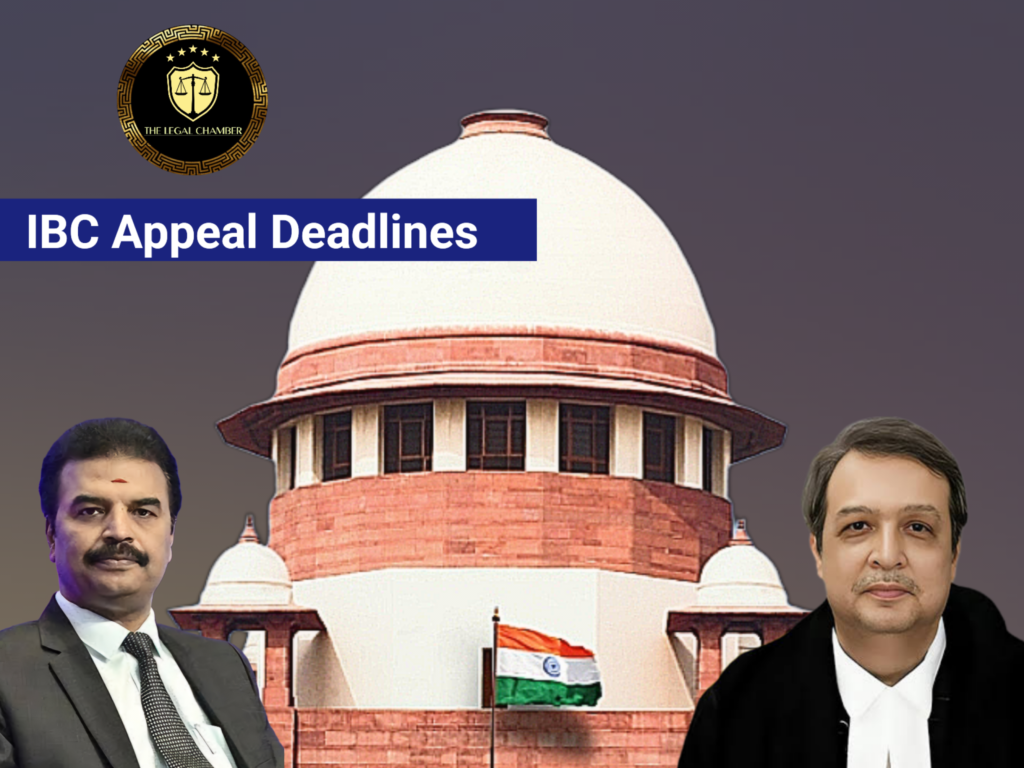
The Supreme Court held that appeals under Section 61(2) of the Insolvency and Bankruptcy Code (IBC) must strictly adhere to the 30-day limitation period, extendable by only 15 days upon showing “sufficient cause.” The NCLAT cannot condone delays beyond this 45-day window, as the IBC’s time-bound framework overrides equitable considerations.
Facts Of The Case:
Tata Steel’s resolution plan for Rohit Ferro-Tech Ltd. was approved by the NCLT on 07.04.2022. Respondent No. 1, a minority shareholder, filed an appeal before the NCLAT on 23.05.2022 (e-filing) and 24.05.2022 (physical filing), seeking condonation of a 15-day delay. The NCLAT allowed the delay, citing Section 4 of the Limitation Act, 1963, as the 30-day period ended on a court holiday (08.05.2022, a Sunday). Tata Steel challenged this, arguing the appeal was filed on the 46th/47th day, exceeding IBC’s 45-day limit (30+15 days). The respondent contended the limitation period began only on 08.04.2022 (when the order was disclosed to stock exchanges), not the NCLT’s pronouncement date (07.04.2022). The Supreme Court examined whether the NCLAT could condone delays beyond the statutory 45-day cap under IBC.
Procedural History:
The case originated from the NCLT Kolkata’s approval of Tata Steel’s resolution plan for Rohit Ferro-Tech Ltd. (Corporate Debtor) on 07.04.2022. Respondent No. 1 (a minority shareholder) filed an appeal before the NCLAT on 23.05.2022 (e-filing) and 24.05.2022 (physical filing), seeking condonation of a 15-day delay under Section 61(2) of the IBC. The NCLAT, by order dated 14.12.2022, condoned the delay, erroneously computing the limitation period from 08.04.2022 (alleged disclosure date) instead of the NCLT’s order date (07.04.2022), and extended the deadline to 24.05.2022 under Section 4 of the Limitation Act. Aggrieved, Tata Steel appealed to the Supreme Court, which, on 07.05.2025, overturned the NCLAT’s order, ruling the appeal time-barred as it exceeded the IBC’s strict 45-day limit (30+15 days). The Supreme Court clarified that the limitation period commences from the NCLT’s pronouncement date, and no condonation is permissible beyond 15 days.
Read Also: Supreme Court Upholds ‘Belting Method’ : Orders Equal Compensation for Adjacent Villages in Haryana Land Acquisition Case
Court Observation:
The Supreme Court underscored the strict statutory framework of the IBC, emphasizing that Section 61(2) imposes a mandatory 30-day limitation period for appeals, extendable by only 15 days upon showing sufficient cause. The Court clarified that while Section 238A makes the Limitation Act applicable to IBC proceedings, Section 4 (which extends deadlines falling on court holidays) applies solely to the initial 30-day period and not to the additional 15-day condonable window. It rejected the respondent’s argument that the limitation period commenced from the stock exchange disclosure date (08.04.2022), holding unequivocally that the clock starts from the NCLT’s order pronouncement date (07.04.2022). The Court further stressed that tribunals like the NCLAT, being creatures of statute, cannot exercise inherent powers to condone delays beyond the statutory 15-day extension, as this would contravene the IBC’s time-bound resolution mechanism. These observations reinforce the legislative intent to prioritize finality and efficiency in insolvency proceedings over equitable considerations for delayed filings.
Final Decision & Judgement:
The Supreme Court allowed Tata Steel’s appeal and set aside the NCLAT’s order dated 14.12.2022, holding that the minority shareholder’s appeal was time-barred under Section 61(2) of the IBC. The Court ruled that the 30-day limitation period commenced from the NCLT’s order date (07.04.2022) and not from the subsequent stock exchange disclosure, and that the NCLAT had no jurisdiction to condone delays beyond the statutory 15-day extension period.
Emphasizing the IBC’s time-bound nature, the judgment clarified that the total 45-day window (30+15 days) is absolute and cannot be extended further, even under equitable considerations. The Court rejected the application of Section 4 of the Limitation Act to the condonable period, reinforcing that tribunals must strictly adhere to the IBC’s procedural timelines. Consequently, the appeal filed by the respondent was declared invalid as it was submitted on the 46th/47th day, exceeding the permissible limit. The judgment reaffirms the legislative intent to ensure finality and efficiency in corporate insolvency resolution processes.
Case Details:
Case Title: Tata Steel Ltd. v. Raj Kumar Banerjee & Ors. Citation: 2025 INSC 639 Civil Appeal No.: Civil Appeal No. 408 of 2023 Date: 7th May 2025 Judges/Justice Name: Justice R. Mahadevan & Justice J.B. Pardiwala
Download The Judgement Here